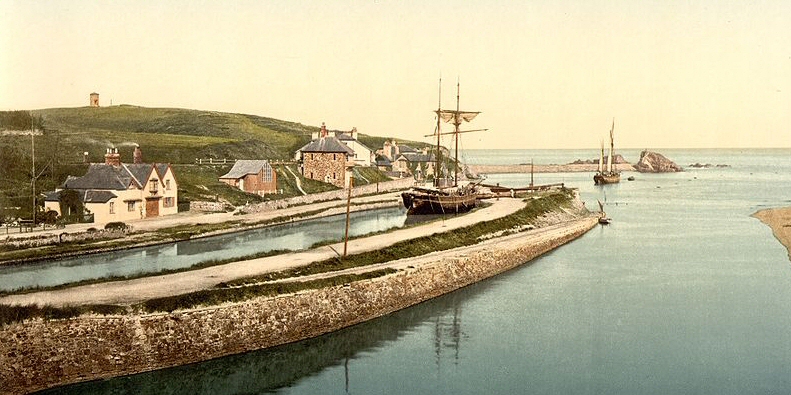Many of you will be familiar with this gem of Cornish poetry. To those that aren’t, enjoy this great taste of the local dialect, with some extra information about its origins. For #NationalPoetryDay 2016 we’ve added a bit of a translation in case you struggle with the vernacular.

Ole Bood
(From an incident at Waterloo Station)
By Jan Homer.
I went to London and Mother too.
Us zeed the Thames, the Tower, the Zoo,
Us did’n knaw then what more ver do,
So us traapsed away to Waterloo
Ver home to Bood.
Our ‘eads was addled with sights and sounds
Our ‘earts was sick and tired of towns,
Our veet was achin’ ver Zummerleaze Downs
In dear ole Bood.
There was crowds of volks in the Bookin’ ‘all,
But of volks us knawed there wad’n a sawl
So I sticked me ‘ead in a pigeon awl-
‘Two tickets ver Bood.’
I looked to Mother, ‘er face was red,
‘Hush Jan, be maazed? ’tis Bude,’ ‘er said,
But then the Clerk ‘ee shawed ‘ees ‘ead,
And—’Good Old Bood!’
All eager-like I says to ‘un
‘Be you from Bood, then, too, my son?’
‘Ees, father, fey I be—no fun,
I be from Bood.’
‘And up ta “Street” where I was born
Could yer the sea and the coachman’s horn,
And I tell ‘ee London’s cruel forlorn
Beside ole Bood.’
‘I wad’n a-born ta Bood’ says I,
`But Bood I live and there I’ll die,
‘Tis a place where a-body can see the sky
Is dear ole Bood.’
‘And the streets by clayn and the houses too,
And the Station beateth Waterloo,
And even poor volks gets a voo,
Home there to Bood.’
‘So’ sonny, I’ll see ole Bood to day,
And the Ceres sailin’ in the Bay
And the beaudiful sunset o’er the zay,
And when I sees yer volks I’ll say
Yer love ta Bood.’
Jan Homer is actually the pen-name of Ernest Shobrooke who was a Methodist preacher on the Okehampton circuit in 1910 before transferring to Bude where he stayed for the rest of his life. Although he is not very well-known, he wrote a lot in dialect form and this poem is still popular in the area.
The poem describes a trip by train from Bude to Waterloo in London. Bude Railway station closed in 1966 and these days there are very few signs of where it was. To see more about Bude station (including this poem), head over to the Bude Heritage Centre who have an exhibition called ‘Steaming into Bude’ running throughout February.
With special thanks to Audrey Aylmer for her information on this great poem. It has been stored in the Bude & Stratton branch archive of the Old Cornwall Society – (we don’t own the copyright.)
Most of the poem is easily understandable, but if you’re not sure, here’s a little translation below that may help with a couple of words.
Ole Bood – A Translation!
(From an incident at Waterloo Station)
By Jan Homer.
I went to London and Mother too.
Us zeed the Thames, the Tower, the Zoo, (We saw the Thames, the Tower, the Zoo)
Us did’n knaw then what more ver do, (We didn’t know what else to do)
So us traapsed away to Waterloo (So we traipsed away to Waterloo)
Ver home to Bood. (Back home to Bude)
Our ‘eads was addled with sights and sounds (Our heads were addled with sights and sounds)
Our ‘earts was sick and tired of towns, (Our hearts were sick and tired of towns)
Our veet was achin’ ver Zummerleaze Downs (Our feet were aching for Summerleaze Downs)
In dear ole Bood.
There was crowds of volks in the Bookin’ ‘all, (There were crowds of people in the Booking Hall)
But of volks us knawed there wad’n a sawl (But of people we knew, there wasn’t a soul)
So I sticked me ‘ead in a pigeon awl- (So I stuck my head in a pigeon hole)
‘Two tickets ver Bood.’
I looked to Mother, ‘er face was red,
‘Hush Jan, be maazed? ’tis Bude,’ ‘er said, (“Hush Jan, I’m amazed, it’s Bude!” she said
But then the Clerk ‘ee shawed ‘ees ‘ead, (But then the clerk he showed his head)
And—’Good Old Bood!’
All eager-like I says to ‘un (All eagerly, I said to him)
‘Be you from Bood, then, too, my son?’ (Are you from Bude too, my son?)
‘Ees, father, fey I be—no fun, (Yes father, faith I be (for sure!), no joke)
I be from Bood.’ (I’m from Bude)
‘And up ta “Street” where I was born
Could yer the sea and the coachman’s horn, (You could hear the sea and the coachman’s horn)
And I tell ‘ee London’s cruel forlorn (I tell you that London’s forlorn)
Beside ole Bood.’ (Compared to Bude)
‘I wad’n a-born ta Bood’ says I, (I wasn’t born in Bude, I said)
`But Bood I live and there I’ll die, (But Bude is where I live and will die)
‘Tis a place where a-body can see the sky (It’s a place where anybody can see the sky)
Is dear ole Bood.’
‘And the streets by clayn and the houses too, (The streets are clean and the houses too)
And the Station beateth Waterloo, (And the station is better than Waterloo)
And even poor volks gets a voo, (And even poor people get a view)
Home there to Bood.’
‘So’ sonny, I’ll see ole Bood to day,
And the Ceres sailin’ in the Bay (I’ll see the Ceres [a famous ketch sailing boat from Bude) in the Bay)
And the beaudiful sunset o’er the zay, (And the beautiful sunset over the sea)
And when I sees yer volks I’ll say (And when I see your family I’ll send..
Yer love ta Bood.’ (.. your love to Bude).
